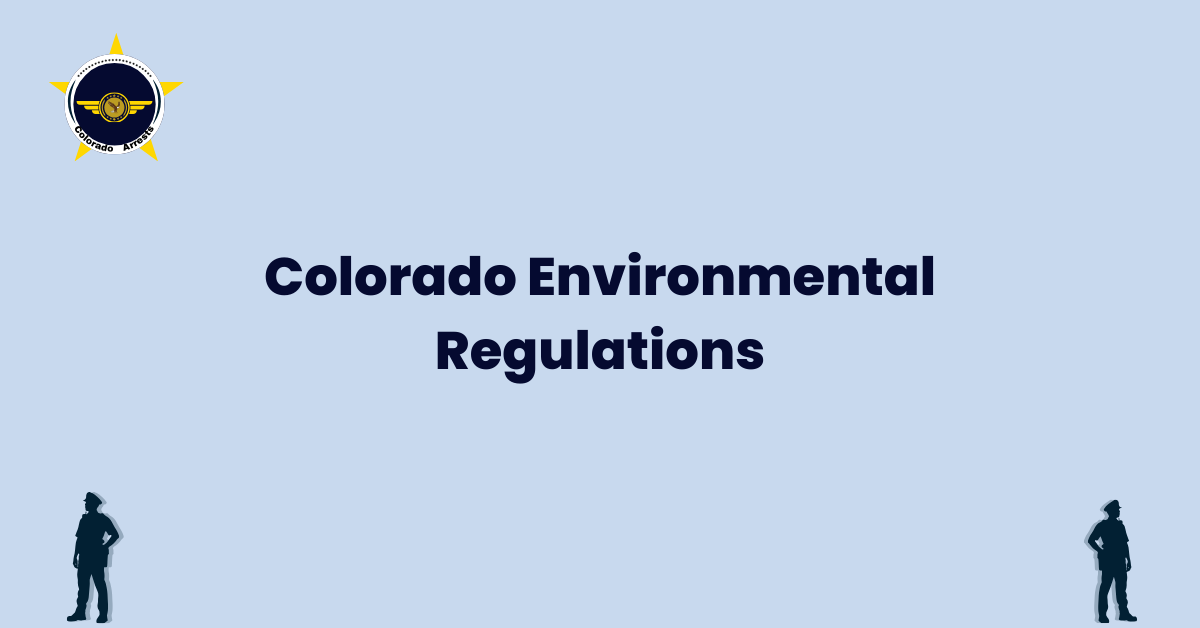Colorado Environmental Regulations
Welcome to this informative guide on Colorado Environmental Regulations. In this article, we will explore the various regulations and policies that govern environmental protection in the beautiful state of Colorado. Whether you are a resident, business owner, or simply interested in learning more about environmental sustainability, this guide will provide you with valuable insights and resources.
Colorado is known for its breathtaking landscapes, abundant wildlife, and pristine natural resources. To ensure the preservation of these assets, the state has implemented a comprehensive set of environmental regulations. These regulations are designed to protect the air, water, land, and wildlife, while also promoting sustainable practices and responsible development.
Colorado Environmental Regulations Protecting Nature’s Treasures
Colorado is a state blessed with natural wonders, from towering mountains to cascading waterfalls. To ensure the preservation of these treasures, the state has implemented a comprehensive set of environmental regulations. These regulations are designed to protect the air, water, land, and wildlife, while also promoting sustainable practices and responsible development.
Ensuring Clean Air for All
Colorado recognizes the importance of clean air for the health and well being of its residents. The state has implemented strict regulations to reduce air pollution and improve air quality. These regulations cover a wide range of industries, from power plants to automobile emissions. By enforcing these regulations, Colorado strives to provide its citizens with clean, breathable air.
Safeguarding Precious Water Resources
Water is a vital resource, and Colorado understands the need to protect its rivers, lakes, and groundwater. The state has put in place regulations to prevent water pollution and ensure the conservation of this precious resource. These regulations govern activities such as industrial discharges, agricultural practices, and wastewater treatment. By safeguarding its water resources, Colorado aims to preserve its natural beauty and support its thriving ecosystems.
Promoting Responsible Land Management
The diverse landscapes of Colorado, from lush forests to arid plains, are a testament to its natural beauty. To maintain the integrity of these landscapes, the state has implemented regulations for responsible land management. These regulations address issues such as land development, mining activities, and reclamation efforts. By promoting responsible land management practices, Colorado strives to balance economic growth with environmental sustainability.
Protecting Wildlife and Biodiversity
Colorado is home to a rich diversity of wildlife, from majestic elk to elusive mountain lions. Recognizing the importance of preserving this biodiversity, the state has established regulations to protect its wildlife and their habitats. These regulations prohibit activities such as illegal hunting, habitat destruction, and the introduction of invasive species. By protecting its wildlife, Colorado aims to maintain the delicate balance of its ecosystems.
Encouraging Sustainable Practices
Colorado is committed to promoting sustainable practices that minimize harm to the environment. The state encourages businesses and individuals to adopt sustainable practices, such as energy efficiency, waste reduction, and the use of renewable resources. Through incentives and educational programs, Colorado aims to create a culture of sustainability that benefits both the environment and the economy.
FAQs
What are the main objectives of Colorado’s environmental regulations?
The main objectives of Colorado’s environmental regulations are to protect the state’s air, water, land, and wildlife, while also promoting sustainable practices and responsible development. These regulations aim to ensure the preservation of Colorado’s breathtaking landscapes, abundant wildlife, and pristine natural resources.
Which agencies are responsible for enforcing environmental regulations in Colorado?
There are several agencies responsible for enforcing environmental regulations in Colorado. The main agencies include the Colorado Department of Public Health and Environment (CDPHE), the Colorado Oil and Gas Conservation Commission (COGCC), and the Colorado Department of Natural Resources (DNR). These agencies work together to monitor and enforce compliance with environmental regulations.
What are some of the key environmental issues addressed by Colorado’s regulations?
Colorado’s regulations address a range of key environmental issues. These include air quality management, water quality protection, hazardous waste management, land and resource conservation, wildlife protection, and sustainable energy development. By addressing these issues, the regulations aim to ensure the long term health and sustainability of Colorado’s environment.
How can businesses comply with Colorado’s environmental regulations?
Businesses can comply with Colorado’s environmental regulations by taking several steps. These include understanding and familiarizing themselves with the specific regulations that apply to their industry, implementing pollution prevention measures, properly managing and disposing of hazardous waste, monitoring air and water quality, and promoting sustainable practices. It is also important for businesses to stay updated on any changes or updates to the regulations.
What resources are available to help individuals and businesses navigate Colorado’s environmental regulations?
There are several resources available to help individuals and businesses navigate Colorado’s environmental regulations. The CDPHE website provides comprehensive information, guidance documents, and resources on various environmental topics. Additionally, there are consulting firms, industry associations, and non profit organizations that offer assistance and support in understanding and complying with the regulations.
How can individuals contribute to environmental protection in Colorado?
Individuals can contribute to environmental protection in Colorado by adopting sustainable practices in their daily lives. This can include conserving water and energy, reducing waste and recycling, supporting local and sustainable businesses, advocating for environmental policies, and participating in community clean up and conservation efforts. Every individual action can make a difference in preserving Colorado’s natural resources.
Conclusion A Commitment to Environmental Stewardship
As you can see, Colorado takes its role as an environmental steward seriously. Through comprehensive regulations and a commitment to sustainable practices, the state strives to protect its natural resources and ensure a bright future for generations to come. Whether you are a resident, business owner, or simply a nature enthusiast, it is our collective responsibility to uphold these regulations and preserve the beauty of Colorado.







